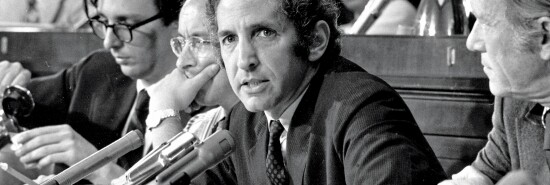
Daniel Ellsberg, 1931-2023
Jay Caruso
Daniel Ellsberg, a military analyst who leaked the Pentagon Papers, detailing U.S. actions during the Vietnam War, died June 16 at his home in California. He was 92 years old.
In a statement, Ellsberg’s family said he died after a diagnosis of pancreatic cancer for which he refused, at his advanced age, to undergo chemotherapy treatment.
MILITARY GENERATION Z RECRUITING WOES WORSENED BY TIKTOK BAN AND BIG TECH COMPETITION
The Pentagon Papers, a project started by Defense Secretary Robert McNamara, was a voluminous study, comprising nearly 7,000 pages. The papers detailed U.S. involvement in Southeast Asia from 1945 to 1967 and how the Truman, Eisenhower, Kennedy, and Johnson administrations had misled the public about the extent of the nation’s involvement in Vietnam. It formed the basis for Ellsberg turning against the Vietnam War. Ellsberg’s subsequent release of sections of the report to the press in 1971 ignited a two-year legal and political battle, culminating in a landmark First Amendment Supreme Court decision and criminal charges against Ellsberg and his anti-war friend Anthony Russo under the Espionage Act. A judge subsequently dismissed all charges against the duo before they reached a jury, citing government actions that “offended a sense of justice.”
Ellsberg hardly appeared the prototypical anti-war activist. Born in Chicago in 1931 to European Jewish immigrants who later converted to Christian Scientists, Ellsberg won a full scholarship to Harvard, where he graduated summa cum laude in 1952, subsequently winning a Marshall Scholarship to attend the University of Cambridge in England. He joined the Marines in 1954 as a commissioned officer and as an expert marksman commanded a rifle company in the 2nd Marine Division at Camp Lejeune, North Carolina, becoming a dedicated Cold War warrior and hawk over Vietnam. Following his discharge from the Marines in 1957, Ellsberg returned to Harvard to get his Ph.D. in economics. Soon after, he joined the RAND Corporation, where he worked on nuclear strategy.
Ellsberg went on to work for the Pentagon in 1964 and spent two years in South Vietnam working for the State Department. Upon his return from Vietnam, he went back to work at RAND, where he worked on the top-secret cache of classified documents that later became the Pentagon Papers.
Following the initial reporting of the Papers by the New York Times, the Nixon administration, citing national security concerns, filed for a restraining order barring further publication of the papers. Following a 2nd U.S. Circuit Court of Appeals affirmation, the New York Times made an emergency appeal to the Supreme Court, which agreed to hear the case on June 26, 1971. The court issued its 6-3 decision four days later. The fractured majority offered six different concurring opinions, and the three dissenting justices argued the court moved too quickly to resolve the critical issues at stake.
Following the dismissal of the charges against Ellsberg, the Watergate scandal took hold of national news, and he largely receded to private life, teaching and writing. He became part of the “no nukes” movement and a vocal anti-war opponent. He opposed the Iraq War that started in 2003, appearing at plenty of rallies and anti-war protests.
Ellsberg’s advocacy for fighting government secrecy took a darker turn when he became an outspoken defender of WikiLeaks and its founder, Julian Assange, going so far as to testify on his behalf at an extradition hearing in 2020. Ellsberg also defended two figures who became infamous for their release of records to WikiLeaks. The first, Chelsea Manning, a U.S. Army soldier and intelligence analyst, sent 750,000 records to WikiLeaks, including diplomatic cables, Army logs, and diaries and videos. In 2015, Ellsberg traveled to Russia and had his photo taken with Edward Snowden, the former computer intelligence consultant for the National Security Agency who leaked information about surveillance programs run by the NSA. Snowden fled to Russia in 2013 after the country promised him asylum. President Vladimir Putin granted Snowden Russian citizenship in 2022.
CLICK HERE TO READ MORE FROM THE WASHINGTON EXAMINER
Ellsberg believes his release of the Pentagon Papers hastened the end of the Vietnam War, primarily because of the actions of Richard Nixon and his administration. In an interview in 2021, Ellsberg told the New Yorker that “in short, the criminal actions that the White House took against me were extraordinarily revealed in ways that led to this absolutely unforeseeable downfall of a President, which made the war endable.”
